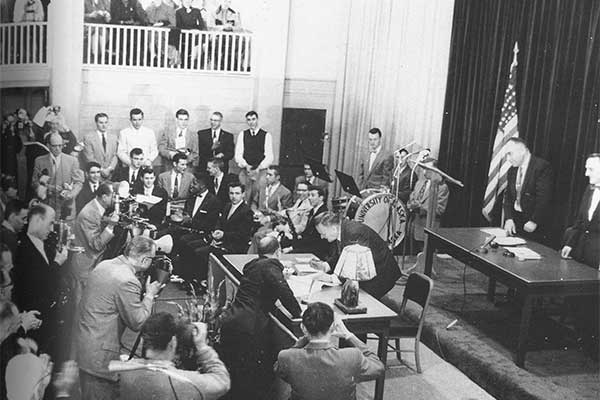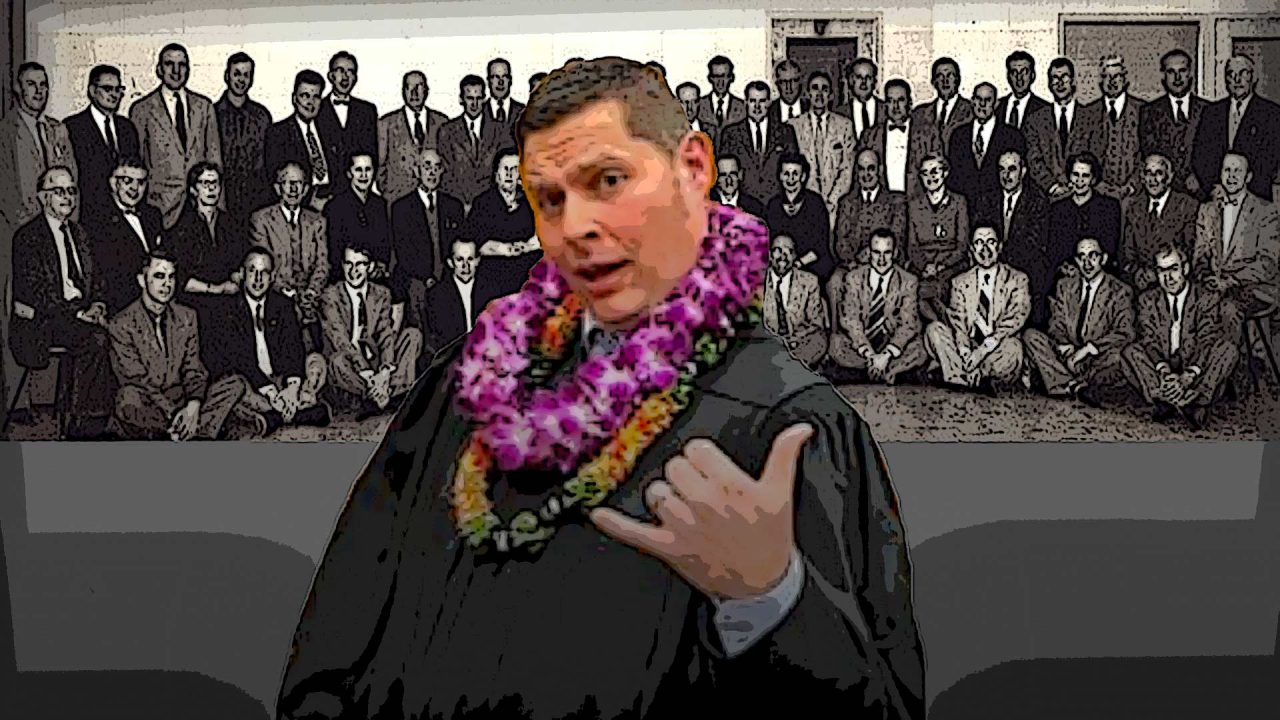
Anchorage Superior Court Judge Adolph Zeman’s recent 33-page decision, declaring two key state homeschool statutes unconstitutional, is riddled with errors of fact and law. The bottom line is this: The statutes are clearly constitutional and Zeman had no authority to throw the educational plans of 23,000 Alaskan children into a state of disarray.
Zeman’s ruling hinged on his determination that public funds, used by local school districts to reimburse parents for correspondence course payments, are a “direct benefit” to the institutions that provide those courses.

Since the homeschool statutes allow parents to purchase correspondence courses from private or religious educational institutions, Zeman concluded those statutes violate the third sentence of Article VII, Section 1 of the Alaska Constitution that prohibits state funds going to the “direct benefit of any religious or other private educational institution.”
Zeman was flat out wrong. The question of what constitutes a “direct benefit” and what constitutes an “indirect benefit” was discussed extensively by our State Founders at the Constitutional Convention.
Article VII was drafted by the Preamble & Bill of Rights Committee chaired by Dorothy Awes, an Anchorage lawyer who was later inducted into the Alaska Women’s Hall of Fame. When Section 1 came up for consideration on the convention floor, the Committee asked Delegate Roland Armstrong to speak on its behalf.
Armstrong was a Presbyterian minister. Coming to Alaska in 1940, he served all over the state, later becoming president of Sheldon Jackson School.
He began his presentation by saying, “in Section 1 the Committee has kept a broad concept and has tried to keep our schools unshackled by constitutional roadblocks.” That key statement of our Founders’ intent should have stopped Zeman in his tracks.

Armstrong brought up the “direct benefit” language and said it prohibited use of public funds for “maintenance and operation” of schools. He said it “does not prohibit the contracting or giving of services to the individual child, for that child benefits as his part of society.” Towards the end of this debate, Armstrong defined direct benefits as “the direct appropriation for building or maintenance of private institutions.”
The use of public funds for educational materials and services from private educational institutions was specifically addressed by the Convention after Delegate Jack Coghill introduced an amendment that would have added the words “or indirect” immediately after the word “direct” in Section 1.
Delegate Yule Kilcher from Homer spoke directly on this issue. He stated his five youngest children were educated at home through the “Calvert courses” homeschool program, for which the government paid.
Kilcher was concerned that prohibiting “indirect benefits” in the Constitution would cut off his ability to receive public funds for these courses. He said, “I understand that the Calvert course could possibly be construed not to be available anymore, either, if indirect help were not available to a private school.”
Not a single delegate disagreed with Kilcher’s express intent to use public funds for payments to private educational institutions. The only person who responded to Kilcher was Coghill who tried to assure Kilcher that his proposed amendment would not prevent Alaskan families from receiving state support for the Calvert courses.
When Coghill first introduced his amendment to prohibit “indirect” benefits, he said the state could still contract directly with private or parochial institutions to provide a service to the public. He said, “I do not deny that to the private schools because I feel that that is an instrument of public benefit because the child is benefitting from it from a public standpoint, and a contractual agreement between the organization and our organized state would therefore be in effect.”

The majority of the delegates wanted nothing to do with Coghill’s assurances. Delegate Ralph Rivers, formerly the Alaska Attorney General, warned Coghill, “you are only stirring up an argument when you talk about prohibiting the disbursement of money for an indirect benefit to a parochial or private institution. You are reaching clear out to ad infinitum in the realms of logic and association. You don’t treat it that way, you don’t stir up that kind of an argument. If there is a public purpose for which money is to be extended it does not matter if some of it does result in an indirect benefit to some private concern.”
Immediately after Kilcher’s speech on the importance of not preventing state funding of private correspondence courses, and Coghill’s conciliatory reply, the Founders voted. Coghill’s amendment to prohibit indirect benefits was defeated by a vote of 34-19.
Joining Kilcher and Rivers were all seven members of the Committee, mostly attorneys, who drafted Article VII. Other notable delegates wanting to preserve indirect benefits to private institutions were President Bill Egan, Secretary Thomas Stewart, Frank Peratrovich, Marvin “Muktuk” Marston, and Mildred Hermann.
It’s quite disturbing that Judge Zeman decided to circumvent the debate precisely on this point, and apply the judicial activism that Rivers, Awes, and the majority of our Founders specifically sought to avoid. By writing, “the minutes of the Alaska Constitutional Convention demonstrate that the delegate’ understanding of the term ‘direct benefit’ forbids the use of public funds for educational materials and services from private educational institutions,” Zeman landed on the opposite side of the truth.
Our state courts have grown notorious over the last 30 years for ignoring our Founders and rewriting the Constitution
Did Zeman think nobody would read the minutes? Or did he think it didn’t matter what the Founders said – that he could rely on the Alaska Supreme Court to back him up?
Our state courts have grown notorious over the last 30 years for ignoring our Founders and rewriting the Constitution in defiance of statutes that express the will of the people through their elected representatives.
Zeman’s decision needs to be understood for what it appears to be – another domino in a high stakes political game. An action necessitating a reaction. The ultimate fight is over which branch of the Alaska government will set policy in educating our children – the will of the people through elected members of the Legislature, or the will of special interests through the unelected members of the Supreme Court.
The first domino was set in motion by the National Education Association (NEA), the largest union in the country and one of the most powerful lobbyists in Alaska. NEA funded the lawsuit which specifically requested Zeman to declare the homeschool statutes unconstitutional. He not only delivered, but maximized the resulting political chaos through the timing of his release. I’d like to know whether the judge intended this result. The best way to find out is through a grand jury investigation.
I challenge each of those legislators to read the Convention minutes carefully and then do anything but fully support the constitutionality of the homeschool statutes.
Sen. Shelley Hughes and Rep. David Eastman brought this concern to the forefront in their essays on Zeman’s decision. Hughes thought it unfair that Zeman took 14 months to create a problem, then gave the Legislature just two months to fix it.
The court docket gives substantial credence to Hughes’ concerns. The parties to the lawsuit began briefing the issue of constitutionality back in March of 2023 and were finished by early August. Oral argument was originally scheduled for September 13, but Zeman vacated that date and rescheduled it for October 24. Afterwards, Zeman took the matter under submission.
Zeman could have easily rendered his decision before the Legislature convened in January. Instead, he sat on it for six months, finally mailing out his decision to the parties on a Friday afternoon, April 12. When the Legislature was informed of the decision, they had just one month to solve the crisis Zeman created. They failed, generating only a tremendous amount of political uncertainty and passing a stopgap measure that has its own set of constitutional problems. Zeman put the Alaska Supreme Court squarely in the driver’s seat to decide our educational policy.
It has been reported in various media outlets that some legislators believe Zeman made the right decision. I challenge each of those legislators to read the Convention minutes carefully and then do anything but fully support the constitutionality of the homeschool statutes.
In the process of striking down the statutes Zeman seemed to take a political swipe at Gov. Mike Dunleavy, who sponsored the legislation as a state senator back in 2013-2014 through Senate Bill 100. First, Zeman falsely stated SB 100 died in committee. Second, Zeman implied Dunleavy engaged in deceptive practices during the Free Conference Committee, making no mention of substantial amendments Dunleavy made to SB 100 to satisfy initial concerns of constitutionality.
Zeman’s decision is littered with procedural problems. For instance, where does a District 3 judge, sitting in Anchorage, derive authority over school districts, parents, and children in Fairbanks, Nome and Juneau? Compounding this issue is the inability of citizens, harmed by Zeman’s decision but residing outside District 3, to vote against his retention as a judge.
The complaint didn’t allege facts showing the statutes caused any quantifiable damages to the plaintiffs. Local school districts making the allegedly unconstitutional reimbursement payments weren’t named as parties. Basically, the NEA was asking an unelected judge in the Third Judicial District to exercise a “super veto” over legislation that had been on the books for 10 years and then somehow apply that veto to every citizen in every district of Alaska.
If the NEA was confident it could better leverage the judicial branch to accomplish its public policy objectives, Alaska is in a very dark place.
Even the governor doesn’t have that kind of veto power. Under the Constitution, the governor must veto a bill within 15 days of receiving it. If the bill is vetoed, the Legislature can override it.
The governor’s veto power doesn’t include the power to strike out portions of bills that don’t appropriate money. It’s all or nothing. But as you’ll read below, Zeman carved out about 5% of the language of a 10-year-old Act. Where specifically in the Constitution did Zeman obtain this superpower?
Over the past decade, the homeschool statutes have enabled local school districts to pay out hundreds of millions of dollars for the benefit of Alaska children. Tens of thousands of Alaska parents have worked with public teachers and districts to build reliable education plans that can best fulfill their children’s dreams. If the NEA and Zeman can put an abrupt halt to those plans, then our political system has gone off the rails.
If the NEA truly had a problem with the constitutionality of the homeschool statutes, why didn’t they challenge them back in 2014? Judging from their complaint, it seems their concerns weren’t prompted until 2022, when Jodi Taylor, the current Attorney General’s wife, wrote an opinion piece saying the statutes could be used to help fund private school tuition. If the NEA didn’t like where Taylor was heading, why didn’t the union use its powerful lobby in the Legislature to pass more restrictive statutory language? If the NEA was confident it could better leverage the judicial branch to accomplish its public policy objectives, Alaska is in a very dark place.
Zeman’s decision proves Alaska has become a state where a powerful lobby group can influence a relatively young, inexperienced judge to abruptly wipe away years of legislative policy advancements. This is a problem that justifies a constitutional convention, but the NEA has funded the opposition to that too.
The Court would be wise to quickly overturn Zeman’s decision and let the Legislature decide if they want to change their existing educational policy. That’s the way our Founders wanted it done.
As noted above, Zeman attempted to apply a line-item veto to a legislative Act, something even the governor can’t do. The Act was comprehensive, extensively debated and negotiated in various committees in both the Senate and House. The final version contained 62 sections adding, modifying or repealing various statutes. It provided for increases in the Base Student Allowance. Undoubtedly, during the process some legislators agreed to vote for sections they originally opposed because they supported others.
There was no severability clause in the Act, it was a package deal. Zeman had no right to take his red pen to the parts he didn’t like, while maintaining the portions he approved of.
Compounding the illegality of Zeman’s decision are other portions of the Act which specified payment to certain educational institutions that may have been private. Section 31 of the Act allocated public funds to Yuut Elitnaurviat Inc., Southwest Alaska Vocational and Education Center, Partners for Progress in Delta Inc., and Amundsen Educational Center for capital improvements. If any of these institutions were private, such appropriations would be the most likely component of the Act to trigger Delegate Armstrong’s definition of a “direct benefit.”
Furthermore, Sections 36 through 46 of the Act provided tax credits for cash contribution accepted by private organizations and tribal entities. How Zeman could permit these sections in the Act to stand while striking down the homeschool section defies logic and any reasonable legal reasoning.
ALASKA WATCHMAN DIRECT TO YOUR INBOX
One of my sources for this story believes the intent of the NEA lawsuit was to stem the tide of students leaving “brick and mortar” schools that are failing them. Since 2014, the number of Alaska children being home schooled has doubled and is now approaching 20% of all students. Thanks to NEA and Zeman, Alaskan families that can’t afford correspondence courses without government support may have no choice but to return to traditional schools.
NEA’s complaint contains 37 paragraphs alleging facts. Most of them focus on the actions of Dunleavy or the Taylors. Not one of them alleges that homeschooled children are receiving a substandard or inadequate education. The complaint avoids any mention of the many personal and public benefits that private correspondence courses provide.
The NEA isn’t an advocate for our children’s education if it seeks to deny these benefits. The union needs leadership capable of recognizing that individualized learning plans offering correspondence courses open many doors to help our children achieve their dreams. Why should specialized, more convenient, or higher quality courses available through private institutions be available only to the rich who can afford them?
Zeman’s role in advancing the NEA’s objectives, whatever they are, deserves a grand jury investigation led by an independent special counsel. Eastman has called for the impeachment of Zeman, who is up for a retention election this fall. Impeachment is the only recourse available to Alaska citizens living outside the Third Judicial District.
If Zeman has nothing to hide, he should welcome a grand jury investigation to help clear his actions. All Alaskans impacted by Zeman’s decision deserve to know the truth from an independent, non-partisan source. That is exactly the purpose of the investigative Alaska Grand Jury. Our Founders understood that no branch of government can do a better job of getting to the truth.
Oral arguments before the Alaska Supreme Court are scheduled for June 27. The Court would be wise to quickly overturn Zeman’s decision and let the Legislature decide in the next session if they want to change their existing educational policy. That’s the way our Founders wanted it done.
The views expressed here are those of the author.








9 Comments
Mr. Ignell, thanks for the OUTSTANDING summary of the Constitutional Convention. The “indirect” funding issue is the crux of the matter. Alaska’s Blaine Amendment is very weak and does NOT prohibit indirect funding of private/religious educational institutions. Thanks for a wonderful article.
Leftists don’t seem to understand that the Constitution protects free exercise of religion. It does not protect free exercise of fascism. This seems to trouble them greatly.
When will the citizens power of investigative Grand Juries be unleashed? And an even bigger question that all citizens should be clamoring for is…. Why the H is Judge Matthews keeping the GJ Report that investigated SYSTEMIC JUDICIAL CORRUPTION over one year ago still being kept hidden from the public?? What could possibly be in it that ‘they’ are afraid of?
this folks! THIS IS IMPORTANT!
Alaska Constitution, Article VII, section 1: “ Schools shall be free from sectarian control”. This means no public unions and NEA has no standing. Judge Zeman should be impeached.
I’m not sure it’s true that a judge cannot strike down certain parts of a statutes. US district court judges do it all the time. However the point about accountability is excellent: the bulk of people harmed by this decision are outside his district and have no recourse. Anchorage voters are unreliable. They will DEFINITELY elect him again.
Excellent article pointing to the importance of challenging hat one believes to be attacks against homeschooling be it religious or secular. Many religious materials require excellence in education; expounding upon the ability of a student to decide for their self how & what to think rather than INDOCTRINATING a child’s thinking.
Thank you again for bringing this intentional degradation of free educational choice to readers such as myself.
Any judge that makes these kinds of egregious rulings that favor the NEA and teachers’ unions are filling their pockets. Follow the money and organizations they affiliate with. It is about the Constitution and freedom folks! Parents have the right to choose what their child is being taught. Our public school system has become an indoctrination center for pushing the radical left agenda of turning kids against parents and pushing the LGTBQXYZ agenda, including the TRANS movement to harm your child mentally and physically. Stand up and stand firm. Do not give them the ground they seek.
Alaska legislators have effectively entered into a corrupt bargain with the judicial branch. This bargain that allows the judicial branch, the unelected branch of government, to operate as if it has a sovereign claim to understand the will of the people that neither of the elected branches possess. What an incredible notion. What is the will of the people enshrined in our constitution? Today, we are told it is whatever three justices say it is, and the executive and legislative branches have agreed to back up three justices, as though they themselves possessed the full authority of the Constitution, no matter how ridiculous their assertions (and we’ve endured some incredibly ridiculous decisions over the years). In exchange, the judicial branch has agreed at various times to stay out of the legislature’s sandbox. No matter how egregious the actions of legislators (the recent 67% pay raise for legislators is only one recent example), judges try hard to overlook them using the separation of powers doctrine as their go-to excuse. You might remember a few years back when the legislature and the people amended the constitution, only to have the new constitutional amendment vetoed by the supreme court. Who gave them the authority to veto a constitutional amendment? Certainly the constitution gave them no such power. They gave it to themselves, and the elected branches agreed to go along with it in violation of any reasonable reading of the constitution. That’s where we’re at today. If you want to run the state, go run to be a judge. Oh wait, this isn’t Alabama, you can’t actually do that here. If you are even thought to be center-right the radical left who holds sway within the Alaska Bar Association will block your name from ever going before the governor for appointment as an Alaskan judge. Alaska is a frontier state of many good Americans who were never told that we are a state controlled by Democrats but run by Republicans who have agreed to their demands.